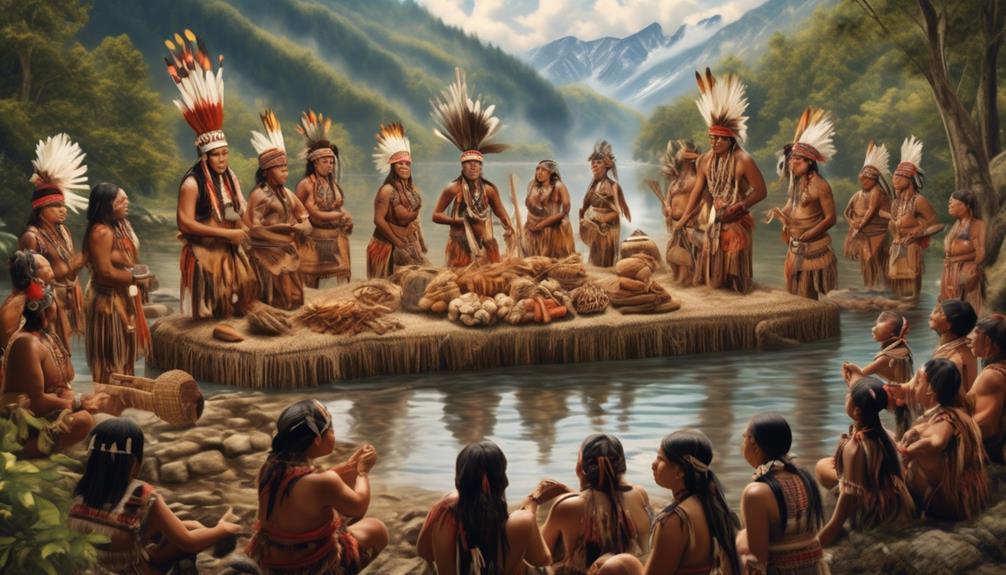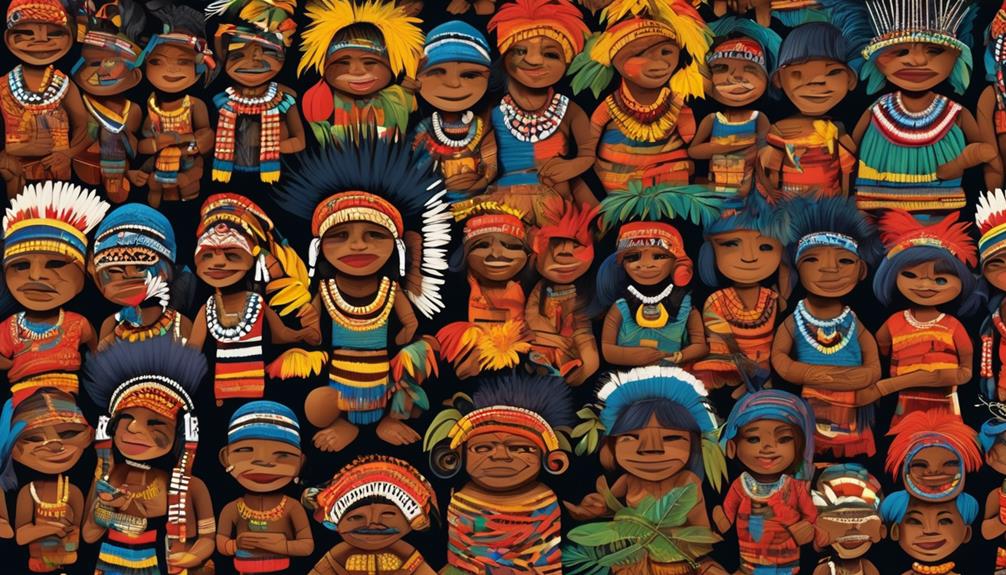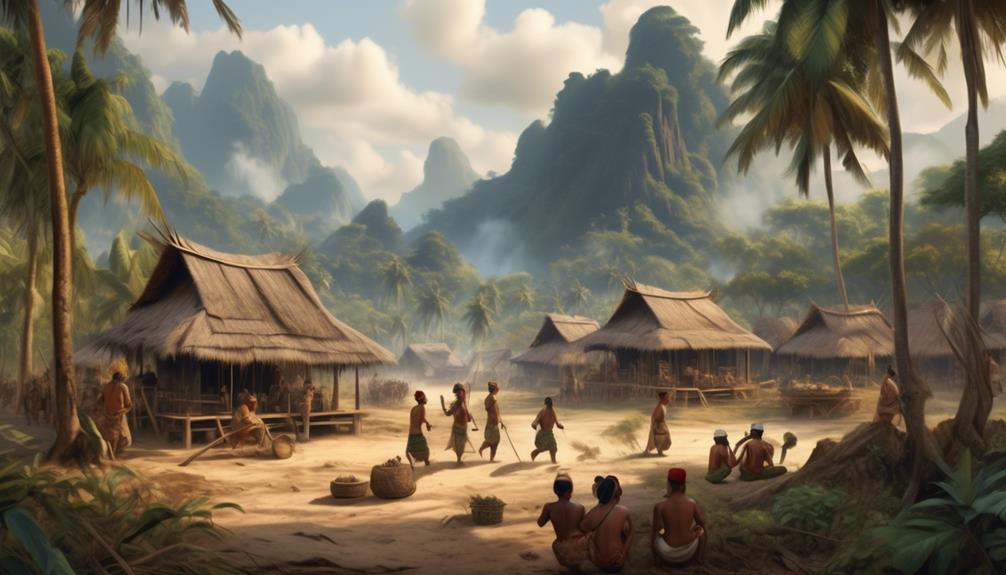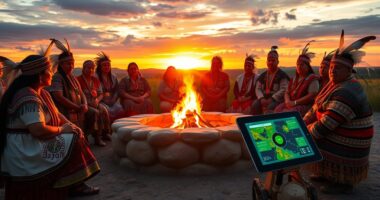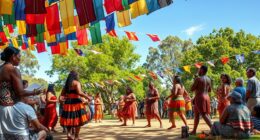In American culture, symbols are often utilized to demonstrate respect and recognition. However, when honoring Indigenous communities, it is crucial that these symbolic acts are complemented by tangible steps.
What are the concrete steps we can take to not only acknowledge the historical and ongoing injustices faced by Indigenous communities, but also actively work towards creating a more equitable and inclusive future for all?
Join me as we explore practical ways to honor and support Indigenous peoples in our everyday lives, and consider the impact of our collective efforts.
Key Takeaways
- Land Acknowledgment and Respect: Understand the significance of the land and its connection to Indigenous communities and acknowledge the traditional custodians of the land while paying respect to Indigenous elders, past, present, and emerging.
- Supporting Indigenous Businesses: Educate ourselves about Indigenous-owned businesses, prioritize purchasing goods and services from Indigenous-owned businesses, spread the word and recommend Indigenous businesses to others, and contribute to the economic growth and sustainability of Indigenous communities.
- Education and Awareness: Seek knowledge about Indigenous history, culture, and contributions, engage with Indigenous literature, art, and oral traditions, understand the impact of colonization and ongoing systemic challenges, support Indigenous-led initiatives and businesses, and foster community engagement and social responsibility.
- Advocating for Indigenous Rights: Support Indigenous-led activism, educate ourselves and others on the struggles faced by Indigenous peoples, demand policy changes that respect Indigenous rights, respect and protect traditional Indigenous knowledge, and amplify Indigenous voices and work towards meaningful change.
- Cultural Appreciation and Preservation: Attend powwows, Indigenous festivals, and storytelling sessions, learn traditional crafts such as beadwork, pottery, and dreamcatcher making, appreciate and celebrate the diversity of Indigenous traditions, support the preservation of Indigenous artistry, and gain a deeper understanding and respect for Indigenous heritage.
Land Acknowledgment
We acknowledge the traditional Indigenous lands on which we gather and recognize the enduring connection that Indigenous peoples have to this land. Acknowledging history and respecting traditions are fundamental in honoring Indigenous peoples.
It's essential to understand the significance of the land on which we stand, and the deep-rooted history and traditions of the Indigenous communities connected to it. We can honor this by acknowledging the traditional custodians of the land and paying our respects to their elders, past, present, and emerging.
Respecting traditions involves actively listening to and learning from Indigenous voices. By doing so, we can gain a deeper understanding of their cultural practices, values, and beliefs. It's crucial to engage with Indigenous communities in a manner that's respectful and considerate of their customs and protocols. We must prioritize building meaningful and mutually beneficial relationships based on trust, respect, and genuine partnership.
Incorporating land acknowledgment into our daily lives and events is a meaningful way to demonstrate our commitment to recognizing and honoring the Indigenous peoples' enduring connection to the land. We must approach this practice with sincerity and a genuine desire to contribute to reconciliation and healing.
Support Indigenous Businesses
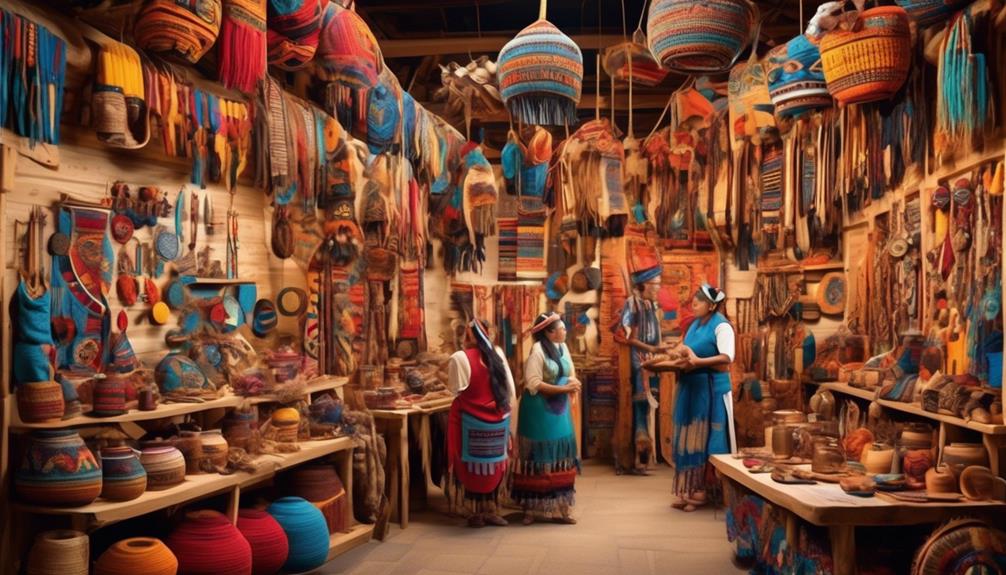
In supporting Indigenous businesses, it's essential to actively seek out and prioritize their products and services in our daily transactions. By doing so, we can promote economic empowerment and celebrate traditional craftsmanship.
Here are some meaningful ways we can support Indigenous businesses:
- Educate Ourselves: Take the time to learn about Indigenous-owned businesses in your area or online. Understanding their stories, traditional practices, and the significance of their products can deepen our appreciation and connection.
- Shop Mindfully: Whenever possible, choose to purchase goods and services from Indigenous-owned businesses. This intentional decision contributes to the economic growth and sustainability of Indigenous communities.
- Share and Recommend: Spread the word about Indigenous businesses, whether through word-of-mouth, social media, or online reviews. Recommending their products or services to others helps amplify their reach and impact.
- Attend Cultural Events: Participate in Indigenous cultural events, markets, or fairs where artisans and entrepreneurs showcase their offerings. Engaging with and supporting these events fosters a sense of community and respect for Indigenous traditions.
Together, let's embrace the opportunity to uplift Indigenous voices and businesses, fostering a more inclusive and equitable economic landscape.
Educate Yourself and Others
To truly honor and support Indigenous peoples, it's crucial to actively seek out knowledge about their history, culture, and contributions to society. Cultural sensitivity and historical understanding are essential in this journey. Educating ourselves and others about Indigenous peoples fosters community engagement and social responsibility. It's important to approach this education with an open mind and a willingness to listen and learn from Indigenous voices.
Engaging with Indigenous literature, art, and oral traditions can provide valuable insights and perspectives. Learning about the impact of colonization and ongoing systemic challenges faced by Indigenous communities is crucial for developing a deeper understanding of their experiences.
Seeking out opportunities to support Indigenous-led initiatives and businesses can also be a powerful way to contribute to their communities. By educating ourselves and others, we can work towards creating a more inclusive and equitable society. It's a collective responsibility to ensure that the rich and diverse cultures of Indigenous peoples are respected and celebrated.
Advocate for Indigenous Rights
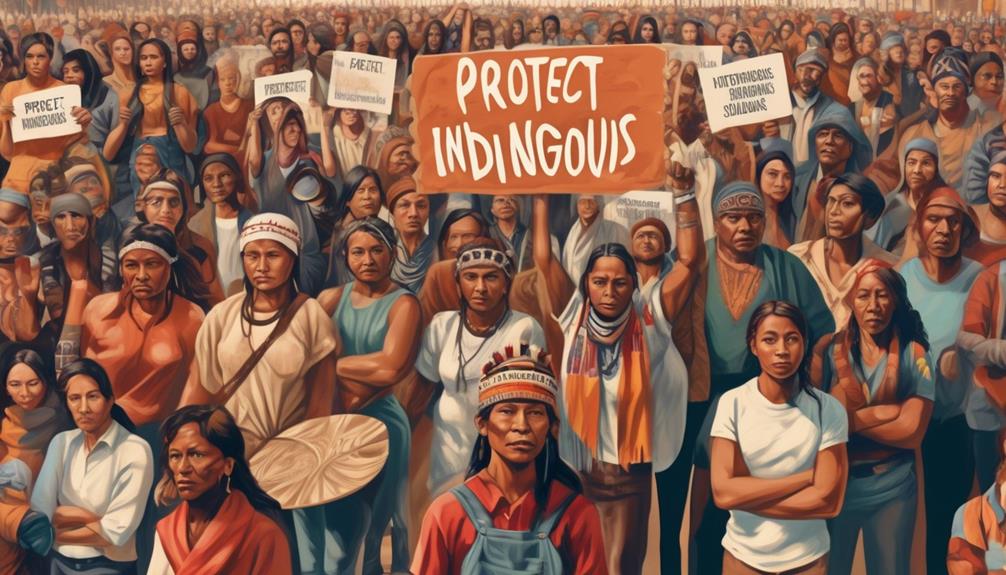
Advocating for Indigenous rights requires an understanding of the historical and cultural context of their experiences and a commitment to amplifying their voices in the pursuit of justice and equality. As we advocate for Indigenous rights, it's essential to recognize the complexities and nuances of their struggles and to stand in solidarity with their fight for sovereignty and representation.
Here are some important ways we can actively engage in advocacy:
- Support Indigenous-led Activism: We can uplift and amplify the activism led by Indigenous communities, ensuring that their voices and initiatives are given the platform and resources they need.
- Educate Ourselves and Others: By continuously educating ourselves and others on the historical and ongoing injustices faced by Indigenous peoples, we can raise awareness and foster empathy, essential for effective advocacy.
- Demand Policy Changes: Engaging in advocacy efforts to demand policy changes that respect Indigenous rights and promote genuine collaboration and consultation with Indigenous communities.
- Respect Traditional Knowledge: Upholding the significance of traditional Indigenous knowledge and practices, and advocating for its respect and protection in all spheres of society.
In our advocacy, let's prioritize amplifying Indigenous voices, respecting their agency, and working towards meaningful and lasting change.
Engage in Cultural Appreciation
We can embrace cultural appreciation by actively engaging with and learning from Indigenous traditions and customs. Participating in cultural events and learning traditional crafts are meaningful ways to show respect for Indigenous cultures. Here's a practical guide to engage in cultural appreciation:
| Cultural Events | Traditional Crafts |
|---|---|
| Powwows | Beadwork |
| Indigenous festivals | Pottery |
| Storytelling sessions | Dreamcatchers |
Attending powwows, Indigenous festivals, and storytelling sessions provides an opportunity to immerse ourselves in the rich tapestry of Indigenous cultures. These events often showcase traditional dances, music, and culinary delights, allowing us to appreciate and celebrate the diversity of Indigenous traditions. Moreover, learning traditional crafts such as beadwork, pottery, and making dreamcatchers not only fosters a deeper understanding of Indigenous artistry but also supports the preservation of these valuable traditions. By actively participating in cultural events and learning traditional crafts, we can honor and respect Indigenous peoples while also gaining a deeper appreciation for their heritage.
Frequently Asked Questions
How Can We Actively Involve Indigenous Communities in Decision-Making Processes That Affect Their Land and Resources?
We actively involve indigenous communities in decision-making processes that affect their land and resources by prioritizing community involvement. We respect their traditional knowledge and leadership, ensuring they have a central role in resource management.
Through open dialogue and collaborative partnerships, we honor their sovereignty and prioritize their input in all decisions that impact their territories. This inclusive approach fosters mutual respect and empowers indigenous communities to shape their own futures.
What Steps Can Individuals Take to Address the Historical Trauma and Generational Trauma Experienced by Indigenous Peoples?
We can address historical and generational trauma experienced by indigenous peoples by prioritizing healing practices and increasing cultural awareness.
Through genuine efforts to understand and support these communities, we can contribute to healing and empowerment.
How Can Non-Indigenous People Support Indigenous Language Revitalization Efforts?
We can support indigenous language revitalization by actively participating in cultural preservation efforts. This involves learning and using indigenous languages, advocating for language education programs, and respecting the importance of language in indigenous communities.
What Are Some Ways to Ensure That Indigenous Knowledge and Traditions Are Respected and Preserved in Mainstream Society?
Preserving traditions and respecting indigenous knowledge is crucial for mainstream society. Involving indigenous communities in decision-making ensures their traditions and knowledge are honored and preserved.
How Can We Address the Lack of Access to Healthcare, Education, and Economic Opportunities for Indigenous Communities?
Improving infrastructure and promoting entrepreneurship are vital in addressing the lack of access to healthcare, education, and economic opportunities for indigenous communities. By investing in better facilities and creating avenues for business development, we can help bridge these gaps.
It's crucial to work collaboratively with indigenous leaders and communities to ensure that our initiatives are respectful, inclusive, and truly meet their needs. Together, we can make meaningful progress towards equity and prosperity for all.
Conclusion
Let's continue to embrace the rich heritage of indigenous peoples by acknowledging their land, supporting their businesses, and educating ourselves and others.
We can also advocate for their rights and engage in cultural appreciation. Together, we can honor and uplift indigenous communities, celebrating their resilience and contributions to our world.
It's time to stand in solidarity and show our respect for the original caretakers of this land.
Mary is a passionate writer who brings creativity and a fresh perspective to our team. Her words have the power to captivate and inspire, making her an essential contributor to our content. Mary’s commitment to storytelling and dedication to promoting Indigenous culture ensures that her work touches the hearts of our readers. We’re fortunate to have her as part of our team.
